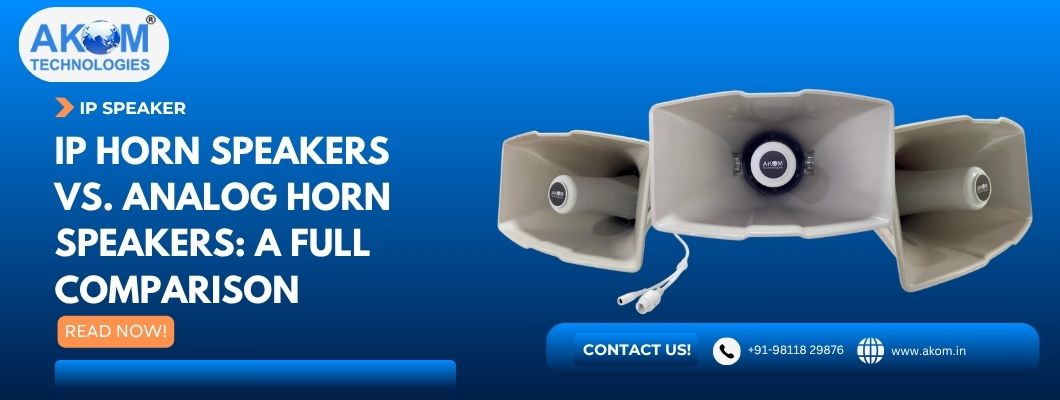Thank you for your query!
Your inquiry has been received. We appreciate your interest.
Our team will review your message and get back to you as soon as possible.

Thank you for your query!
Your inquiry has been received. We appreciate your interest.
Our team will review your message and get back to you as soon as possible.


Wherever public address systems and industrial communications installations are involved, horn speakers have been an important factor in making clear, audible announcements over large spaces. In factories, warehouses, airports, stadiums, or outdoor campuses, the proper horn speaker can be a game-changer. Here's a full analysis between IP horn speakers and analog horn speakers today to assist you with deciding which one serves your needs best.
Let's first define both types briefly before we compare:
IP horn speakers provide better audio clarity. As the transmission of audio is digital, noise and signal degradation that are prevalent in long analog lines are eliminated. IP speakers also provide wide frequency responses and equalization for many of them, so not only is the message loud, but clear and intelligible as well.
However, analog horn speakers tend to distort, particularly when the wiring is long or not well shielded. Their performance can be hugely dependent on the caliber and state of external cables and amplifiers.
One of the strongest domains that IP horn speakers have is in installation. Since Power over Ethernet (PoE) involves a single Ethernet cable to provide both electricity and data, setup becomes greatly simplified. You don't have to install separate lines for audio and power.
Analog systems do take more than one wire, though – one for the audio signal from the amplifier and a second for power. That can add complexity and expense, particularly on bigger installations.
IP horn speakers have excellent compatibility with current IP-based surveillance and communication systems. They are able to integrate with VoIP phones, access control, IP CCTV cameras, and automation platforms. For example, when an intruder is caught through an IP camera, the horn can be triggered to play a message warning the intruder in real time.
Analog horn speakers do not have such integration capability. Any automation would be accompanied by extra analog-to-digital conversion devices and complicated settings.
Adding new units to your current configuration is straightforward with IP horn speakers. Because the units share a network, you just have to connect new speakers to the same LAN, set IP addresses, and configure the software.
Analog systems are more inflexible. Every new speaker needs to be done with correct analog cabling and needs to be compatible with the amplifier capacity, which may hamstring future growth.
IP horn speakers have sophisticated diagnostic and monitoring capabilities. Most of them have remote health checks, firmware updates, and real-time status monitoring. Such proactive maintenance keeps the downtime to a minimum while assisting in troubleshooting without the need to be physically on-site.
Analog horn speakers do not have such clever features. Any malfunction in the system typically needs on-site inspection, which may be time-consuming and intrusive.
Whereas IP horn speakers cost more to buy initially per unit, they tend to save money on long-term cabling, labor, amplifier maintenance, and upgrade expenses. Overall cost of ownership over the long haul may be less because they are efficient and can be remotely managed.
Analog speakers cost less to purchase initially, but as deployment size grows, so do the costs of installing and maintaining them.
If you're installing a new infrastructure, need high scalability, or need to integrate with new security and automation systems, IP horn speakers are the hands-down choice. They introduce digital intelligence to your communications network and protect your investment for the future.
But if you're replacing an existing analog infrastructure and cost is an issue, holding out for analog horn speakers may still be prudent on a short-term basis.
We at AKOM specialize in delivering excellent SIP horn speakers and fiber optic communication solutions. Through our cutting-edge technology and customer-driven approach, we help you design optimized, scalable communication networks. We've got your back when reliability, performance, and innovation are at stake.
Check out our solutions today at akom.in!
